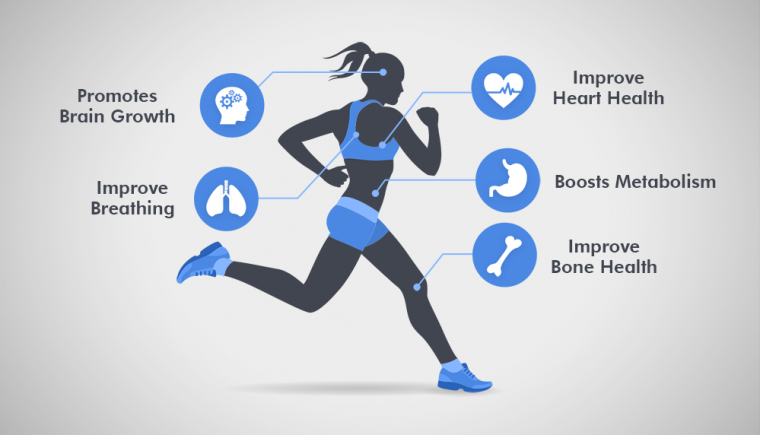
Unlocking Vitality: The Key Benefits of Aerobic Exercise
Aerobic exercise, often referred to as cardio or cardiovascular exercise, encompasses a wide range of activities that get your heart pumping and increase your breathing rate. From running and swimming to cycling and dancing, aerobic exercise offers a myriad of physical, mental, and emotional benefits. In this comprehensive article, we’ll explore the many advantages of incorporating aerobic exercise into your life, shedding light on why it’s not just good for your body but also for your overall well-being.
1. Improved Cardiovascular Health
One of the most evident benefits of aerobic exercise is its profound impact on the cardiovascular system. Engaging in regular aerobic activities helps to strengthen the heart muscle, enhance circulation, and improve the efficiency of the heart’s pumping action. Over time, this reduces the risk of heart disease, lowers blood pressure, and decreases levels of “bad” LDL cholesterol.
2. Weight Management and Fat Loss
Aerobic exercise is a powerful tool for weight management. It burns calories, aiding in weight loss and helping to maintain a healthy weight. Moreover, regular aerobic activity can increase your metabolism, making it easier to manage your weight in the long run.
3. Enhanced Respiratory Function
Aerobic exercise stimulates your respiratory system, making it more efficient. It helps increase lung capacity, allowing you to take in more oxygen with each breath. This increased lung function is particularly beneficial for individuals with respiratory conditions like asthma.
4. Better Mood and Reduced Stress
Aerobic exercise triggers the release of endorphins, often referred to as “feel-good” hormones. These natural mood lifters can help combat depression, anxiety, and stress. Regular aerobic workouts can lead to improved mental well-being, better self-esteem, and a more positive outlook on life.
5. Increased Energy Levels
Contrary to the misconception that exercise depletes energy, aerobic activities actually boost energy levels. Regular participation in aerobic exercise enhances the delivery of oxygen and nutrients to your muscles, helping them work more efficiently. This, in turn, leaves you feeling more energized and less fatigued in daily life.
6. Enhanced Cognitive Function
Aerobic exercise has been shown to have a positive impact on cognitive function. It can improve memory, attention span, and the ability to think clearly. Additionally, it may reduce the risk of cognitive decline and age-related neurodegenerative diseases such as Alzheimer’s.
7. Better Sleep Quality
Engaging in regular aerobic exercise can improve sleep quality. It helps you fall asleep faster and enjoy deeper, more restorative sleep. This can lead to increased daytime alertness and productivity.
8. Stronger Immune System
Regular aerobic exercise can strengthen the immune system, making it more effective at fighting off infections and illnesses. However, it’s important to strike a balance, as excessive exercise can weaken the immune system.
9. Improved Blood Sugar Control
Aerobic exercise can enhance insulin sensitivity, making it easier for cells to take up glucose from the bloodstream. This is particularly important for individuals with, or at risk of, type 2 diabetes.
10. Longevity and Quality of Life
Engaging in regular aerobic exercise is associated with increased longevity. Moreover, it doesn’t just add years to your life; it adds life to your years. The improved health, vitality, and functional capacity that come with regular aerobic exercise can significantly enhance your overall quality of life.
Getting Started with Aerobic Exercise
To reap the multitude of benefits that aerobic exercise offers, it’s crucial to choose activities that you enjoy. Whether it’s a brisk walk in the park, a dance class, or a cycling adventure, finding an activity you love will make it easier to stick to your routine.
Here are some tips for getting started:
- Start Slowly: If you’re new to exercise, begin with low-intensity activities and gradually increase the duration and intensity.
- Set Realistic Goals: Establish achievable goals that motivate you to stay committed. Monitor your progress to track your success.
- Stay Consistent: Aim for at least 150 minutes of moderate-intensity aerobic exercise per week, as recommended by health experts.
- Mix It Up: Vary your activities to prevent boredom and reduce the risk of overuse injuries.
- Listen to Your Body: Pay attention to how your body feels during exercise. If you experience pain or discomfort, consult a healthcare professional.
- Stay Hydrated: Drink plenty of water before, during, and after your workouts to stay hydrated.
Incorporating aerobic exercise into your daily routine can be a life-changing decision. It not only enhances physical health but also promotes mental and emotional well-being, helping you achieve a more vibrant and fulfilling life. So, lace up those running shoes, hop on your bike, or dance to your favorite tunes, and embark on a journey towards a healthier, happier you through the incredible power of aerobic exercise.



